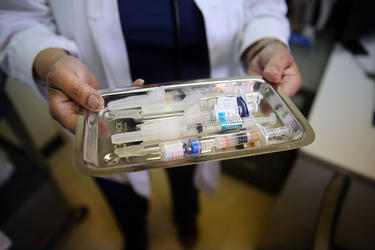The resurgence of measles in America, and the human costs of foregoing vaccination
Spencer Platt/Getty Images


A free daily email with the biggest news stories of the day – and the best features from TheWeek.com
You are now subscribed
Your newsletter sign-up was successful
This is a comeback that no one was hoping for: Measles, which in 2000 was declared eradicated in the United States, has infected dozens in California, Texas, and New York this year alone as more parents are opting out of vaccinating their children. The highly contagious disease kills about one in every 1,000 patients.
According to the Centers for Disease Control and Prevention (CDC), the U.S. had 189 reported cases of measles in 2013; that's a small number compared to what was seen prior to the vaccine's introduction in 1967, but enough to make people worried. "We really don't want a child to die from measles, but it's almost inevitable," Anne Schuchat, director of immunizations and respiratory diseases at the CDC, tells USA Today. "Major resurgences of diseases can sneak up on us."
It's not just measles, either; cases of meningitis and pertussis (whooping cough) are persisting as well. The most vulnerable to these diseases are infants, children with compromised immune systems, and those who cannot be vaccinated for medical reasons. As more children enter the school system without being vaccinated — in Idaho, Oregon, Illinois, Michigan, and Vermont, for example, 4.5 percent of kindergartners were not vaccinated for non-medical reasons — experts say the number of cases will continue to rise.
The Week
Escape your echo chamber. Get the facts behind the news, plus analysis from multiple perspectives.

Sign up for The Week's Free Newsletters
From our morning news briefing to a weekly Good News Newsletter, get the best of The Week delivered directly to your inbox.
From our morning news briefing to a weekly Good News Newsletter, get the best of The Week delivered directly to your inbox.
For the children who are hit by measles, pertussis, or meningitis, it's not like trying to shake off a cold. Meningitis can cause limbs to blacken and wither, leading to amputation and death. Brady Alcaide's infant body couldn't fight off whooping cough, and he died at 9 weeks, so swollen his mother decided to have a closed casket so as to not upset the family. Doctors have no idea where Brady contracted whooping cough. His mother, Kathryn Riffenburg, shared the details of her son's short life with USA Today, for this reason: "I hope Brady has saved babies and protected them because we have spread his story."
Read more about some of the human costs of preventable diseases at USA Today.
A free daily email with the biggest news stories of the day – and the best features from TheWeek.com
Catherine Garcia has worked as a senior writer at The Week since 2014. Her writing and reporting have appeared in Entertainment Weekly, The New York Times, Wirecutter, NBC News and "The Book of Jezebel," among others. She's a graduate of the University of Redlands and the Columbia University Graduate School of Journalism.
-
 5 blacked out cartoons about the Epstein file redactions
5 blacked out cartoons about the Epstein file redactionsCartoons Artists take on hidden identities, a censored presidential seal, and more
-
 How Democrats are turning DOJ lemons into partisan lemonade
How Democrats are turning DOJ lemons into partisan lemonadeTODAY’S BIG QUESTION As the Trump administration continues to try — and fail — at indicting its political enemies, Democratic lawmakers have begun seizing the moment for themselves
-
 ICE’s new targets post-Minnesota retreat
ICE’s new targets post-Minnesota retreatIn the Spotlight Several cities are reportedly on ICE’s list for immigration crackdowns
-
 Trump HHS slashes advised child vaccinations
Trump HHS slashes advised child vaccinationsSpeed Read In a widely condemned move, the CDC will now recommend that children get vaccinated against 11 communicable diseases, not 17
-
 FDA OKs generic abortion pill, riling the right
FDA OKs generic abortion pill, riling the rightSpeed Read The drug in question is a generic version of mifepristone, used to carry out two-thirds of US abortions
-
 RFK Jr. vaccine panel advises restricting MMRV shot
RFK Jr. vaccine panel advises restricting MMRV shotSpeed Read The committee voted to restrict access to a childhood vaccine against chickenpox
-
 Texas declares end to measles outbreak
Texas declares end to measles outbreakSpeed Read The vaccine-preventable disease is still spreading in neighboring states, Mexico and Canada
-
 RFK Jr. shuts down mRNA vaccine funding at agency
RFK Jr. shuts down mRNA vaccine funding at agencySpeed Read The decision canceled or modified 22 projects, primarily for work on vaccines and therapeutics for respiratory viruses
-
 Measles cases surge to 33-year high
Measles cases surge to 33-year highSpeed Read The infection was declared eliminated from the US in 2000 but has seen a resurgence amid vaccine hesitancy
-
 Kennedy's vaccine panel signals skepticism, change
Kennedy's vaccine panel signals skepticism, changeSpeed Read RFK Jr.'s new vaccine advisory board intends to make changes to the decades-old US immunization system
-
 Kennedy ousts entire CDC vaccine advisory panel
Kennedy ousts entire CDC vaccine advisory panelspeed read Health Secretary RFK Jr. is a longtime anti-vaccine activist who has criticized the panel of experts
